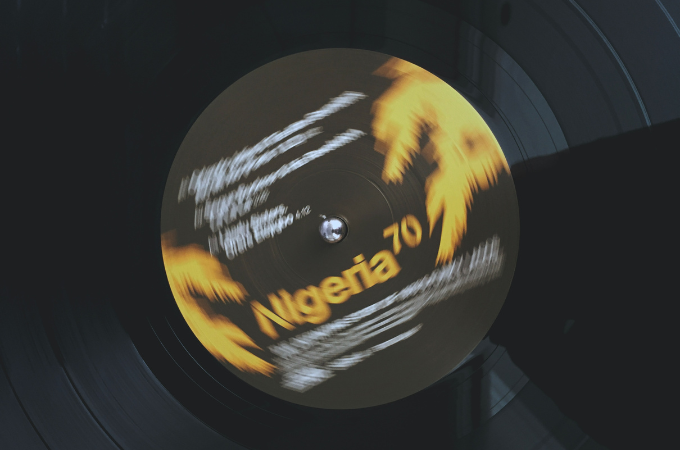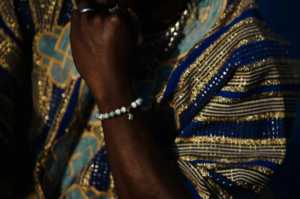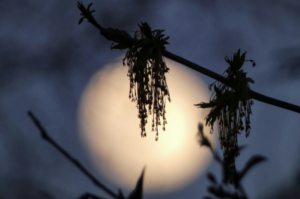
The first time I listened to Tems’ “Higher,” I immediately felt bare, stripped of all bone and muscle, disconnected from body and blood, plunged into another demesne, a different dimension. I will never, ever forget. It was a Monday, and time was in that delicate orange-yellow transition between day and night. I had played that song repeatedly for many months before listening to it, and when I finally listened, I couldn’t stop myself from being stripped of my skin. I told myself that the song was half lamentation, half prayer, half manifestation, half alive. As it took me by my wrists and guided me into a different sphere of existence, my feet were light, as if I treaded on cotton. The only thing I could feel was my breath, disconnected from my lungs, disconnected from all of it.
It wasn’t keeping me alive; it was me.
But Fela’s “Zombie” is what really did it for me. The day I drank the rhythm of that song, I knew what it was to be willingly possessed. I knew what it was to grasp something at the very centre of my sentience. To lose control of one’s tear ducts, for pounds of beautifully crafted moving flesh to travel on autopilot, seeking a hallelujah underneath an altar with no crucifix. It may be blasphemous to say that I danced that day, for it is not completely me that did the dancing. In truth, the dancing was happening to me, like puberty or ageing, it was happening to me like a naturally occurring phenomenon of the flesh. But all the walls could see—like deepening voice and greying hair—was my body swaying along to the sound, not that my skin was being left behind to follow psalms dressed in the tempo of a saxophone, marvelling at the wonder of the matrimony of chaos and order.
On those days, I wanted to fly, and not gently like a dove. But perilously, with the thrill of knowing my wings could snap from reaching higher and that would be the end. I wanted to disappear, to cease to exist, to become nothing, therefore becoming everything; to be wholly immersed in life, to stretch the human condition. But what is being immersed, if not living Crude and cruel, how the gods chose the human experience as the only path to being truly alive; pain and death as the cobblestones to transcendence—the grime of it all. The inherent urge to cling to a body that is as fragile as it is powerful and precious.
Think of a song that you listened to so intimately that the thwacking of the drummer’s sticks on the drums ignited tears from your eyes, jerking you into and out of your body in sudden seconds. Or to feel the hot fury from a tune played in an unspoken language decades ago, collapsing thousands of days and millions of hours into three minutes of a song by an artist on another continent. To provoke a tear from a time stack of memories. To hold the scent of the dead in their wake through a dusty record. To hopefully grasp onto what once was, even in its impossibility. To try. To try. To hit a song on repeat hoping they magically appear before you, like Lazarus obeying the sound of a violin or the strike of piano keys arranged in unique, delicate steps. How beautifully torturous, to know again for three minutes what you once knew for decades in the flesh.
Yet at the sound of Tems’ “Free Mind,” my heart had never beat so wilfully, with so much reason for being, as if pumping blood was a necessity, a biological duty, but listening to her voice was living. Crazy how the lyrics of a song can make you feel the artist’s pain, pleasure, carcass of kismet and arcade of emotions. How the pitch can make you taste their sweat, picture their hair scattered about on their head as they record, dreadlocks skanking about, cowries dangling, fingers peeling as they pick the strings on their guitar, grazing along the edge of insanity, of the holy and unholy, and whatever hides under the shadow of them both. It blows a struggling fire inside me into a blazing hunger.
Because when a musician steps on a stage or in a recording studio, they go. Asin obere ọnwụ. Small death. They cease to exist for minutes or hours. Our perception of them is the only thing that stays. The truth of who they have become is unknown to the skin. They become poltergeists. To drown in music is to leave our skin. To shed it as snakes, just like we leave behind a silk robe to make love in the shower; our hearts beating, the world stopping for a few moments to become more than our body. Just like what a strain of sativa does to the mind, or an orgasm does to our muscles. A rendition of self to find self. But to know that this skin is the reason it will never be our home is the acceptance that often comes with being alive. It is a place where we will always visit, but where the curtains close. The wait of separation wetting our spirit’s tongue with desire. The teasing of our eyes, of our memories, masturbation of the human consciousness.
Still, the human condition keeps it all wrapped and trapped inside this young body of ours. A centenarian spirit found in a twenty-three-year-old body. It jives and thrums about, seeking spaces to slip away, with migraines and miniscule moments of madness, of listening and feeling, and being. Of loving and being loved. Of highs and lows. It clutches onto the inside of our throats, begging to fly. Or at least to try.
“If I fall, I fall,” it says. “But if I fly, then you will know that sanity is poison in the coward’s bones. And the insane are the closest thing to god.” Then I will look around me and negotiate with gravity: to soar; for her exhibition. To burn brightly and detonate. To erupt to the stars and dine with the celestial, then plummet to the ground and dance with the dead. To take flight. To know the meaning of psalms. To be without skin.
Photo by daniel james on Unsplash










COMMENTS -
Reader Interactions